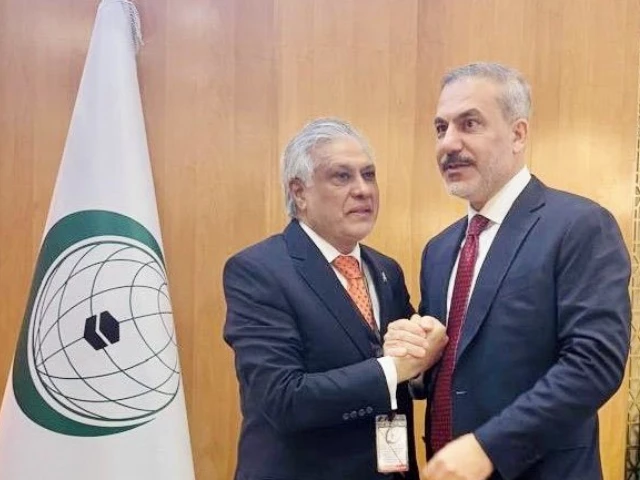Dar will participate in the meeting of Arab-Islamic foreign ministers in Istanbul; Urge full Israeli withdrawal and unhindered aid flow
Deputy Prime Minister and Minister of Foreign Affairs Ishaq Dar with Turkish Foreign Minister Hakan Fidan Photo: X/ForeignOfficePk
ISLAMABAD:
Deputy Prime Minister and Minister of Foreign Affairs Senator Ishaq Dar will join his counterparts from major Arab and Muslim countries in Istanbul on Monday (today) to discuss peace efforts in Gaza.
Invited by Turkish Foreign Minister Hakan Fidan, the meeting brings together Pakistan and seven other Arab-Islamic countries committed to the peace initiative that resulted in the Gaza peace agreement signed in Sharm el-Sheikh.
At the Istanbul gathering, Pakistan will emphasize full implementation of the ceasefire agreement, demand Israel’s complete withdrawal from the occupied Palestinian territory, particularly Gaza, and urge the provision of unhindered humanitarian assistance and reconstruction of the enclave, according to a Foreign Ministry statement.
The Pakistani delegation will also reaffirm the need for a viable, independent and contiguous Palestinian state, with Al-Quds Al-Sharif as its capital, based on pre-1967 borders, in accordance with UN resolutions and the Arab Peace Initiative.
“Pakistan has been and will continue to be committed to efforts aimed at restoring peace, justice and dignity to the Palestinian people, as well as ensuring the realization of their right to self-determination,” the press release said.
Beyond the diplomatic forum, Pakistan’s potential role in the proposed International Stabilization Force (ISF) for Gaza is being deliberated. Defense Minister Khawaja Asif confirmed that the decision to provide Pakistani troops was still being finalized and stressed that any deployment would be carried out under a collective decision and, ideally, a United Nations mandate.
The ISF, a key pillar of the U.S.-brokered peace framework for Gaza, envisions a multinational force drawn from Muslim-majority countries to maintain internal security, assist in reconstruction and secure the borders under Palestinian and international supervision.
Pakistan, with its extensive peacekeeping track record and previous support for the eight-nation initiative behind the Gaza plan, is seen by analysts as a credible candidate.
Islamabad nevertheless faces a dual challenge: aligning its principled pro-Palestinian position with the diplomatic and operational requirements of the proposed peace force. National opinion is strongly supportive of Palestinian self-determination, and any perceived alignment with Western-orchestrated missions could draw criticism.
At the same time, the government has reaffirmed its commitment to working across institutions and following due process before any deployment decisions.
Key issues to watch at the Istanbul meeting will include whether Pakistan sets conditions for its participation in the ISF, how firmly it pushes for Israeli withdrawal and reconstruction from Gaza, and whether the Arab-Islamic group issues a statement setting out the operational conditions for the stabilization force.
As Pakistan prepares to take a seat at the negotiating table in Istanbul, it positions itself at a strategic turning point, moving from diplomatic protest to possible active engagement in regional stabilization efforts. Today’s decisions could mark a milestone in Islamabad’s foreign policy and South Asia’s role in the Middle East peace architecture, observers say.




